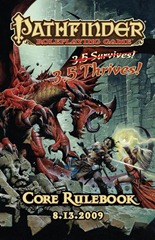 The Pathfinder role-playing game was originally developed under the Open Gaming License as a “replacement” for D&D 3.5th edition after Hasbro announced it would no longer be supporting the game. Hasbro was changing over to its new, streamlined D&D 4th Edition rules, which suddenly left all the 3.5th-edition supplements its OGL had fomented without an available master rule set. However, the Open Game License meant that Paizo, Pathfinder’s developer, was free to take the core of the D&D rule set and create a new, compatible game around them.
The Pathfinder role-playing game was originally developed under the Open Gaming License as a “replacement” for D&D 3.5th edition after Hasbro announced it would no longer be supporting the game. Hasbro was changing over to its new, streamlined D&D 4th Edition rules, which suddenly left all the 3.5th-edition supplements its OGL had fomented without an available master rule set. However, the Open Game License meant that Paizo, Pathfinder’s developer, was free to take the core of the D&D rule set and create a new, compatible game around them.
One noteworthy thing about Pathfinder was that the entire full-length version of the game was offered for free download during its beta-testing period. So when I had the opportunity to speak to Jason Bulman, lead designer for Pathfinder, that was one of the main things I had to ask him about.
Me: Pathfinder originally came about, didn’t it, when Hasbro announced they were sunsetting the 3.5th Edition of Dungeons and Dragons which meant that everybody who had developed adventures for it was going to be out in the cold?
Jason: Well, we saw an opportunity to take what was a very popular ruleset and continue it on. The Open Game License allowed us to use those rules, and we decided that while we wanted to keep the system alive, we wanted to make some upgrades, some fixes, some changes. So we went through the ruleset and we identified the things that we always thought were kind of clunky or didn’t work very well, gave those a tuneup, and then we also decided to add more diversity, more option, more choice to the base classes, so we went through and made a lot of adjustments and changes there too. A lot of this was all designed to make for a better play experience.
Me: And when you were betaing it, I seem to recall that anybody could just download the complete beta version for free. Were you concerned that would have any effect on your sales?
Jason: We were hoping that it would generate interest, right? I mean, allowing everybody to get a chance to take a look at our rules before they hit store shelves and give us their feedback and suggestions really led to them being invested in our game. They were a part of making it. So it really gave us a lot of buzz, it really helped us develop a better game, and in the end it was totally worth it. So we don’t really feel that PDF sales necessarily compete with book sales. I think I personally feel very strongly that the sale of electronic books is a companion. Especially in our industry where people need good reference material. Referencing something at the table is one thing, but sitting down to read? Maybe you want a big physical book for that. A lot of people do.
Me: I notice a lot of gaming places here give the PDF version away free with purchase of a printed book.
Jason: We have a subscription process where if you subscribe to our books we will ship them to you and give you the PDF for free.
Me: And you sell this through the on-line RPG services like RPGNow and DriveThruRPG?
Jason: Actually our PDFs I believe are sold exclusively through our website at Paizo.com.
Me: So, going forward as Dungeons & Dragons continues to evolve into new editions, is Pathfinder going to stay pretty much the same, or are you going to come up with new versions of that eventually?
Jason: Well, you know, our game is only two years old at this point, so we’re not rushing to make a new edition of Pathfinder right at the moment. But the game continues to evolve, and even now two years later there are things that I wish I could have changed or fixed but I didn’t. Some of those things we really can’t fix, they’re endemic, built into the system, so we can’t really change those, but as we go along we make a lot of additions and changes to the game as we move along. It’s a living thing. But, yeah. I mean we’re on a different path now. So we’re doing our own thing, and if the time comes for a new edition, then we’ll certainly look at that. But I don’t think we’re there yet.
Me: The Open Gaming License allowed you to basically take the D&D rules and create a whole new game around them, or rather create a upgraded version of the original.
Jason: Yes.
Me: I noticed that Hasbro basically moved away from the Open Game License.
Jason: Well, they do have a game system license, but it’s kind of different. It works a little differently. It’s not quite as open as the Open Game License.
Me: I seem to recall the Open Game License was originally developed as a marketing move on Hasbro’s part.
Jason: Well, it was an attempt to get the entire industry producing books for D&D. And it worked wonderfully. Everybody started making compatible products.
Me: I seem to recall Hasbro wasn’t terribly pleased with Pathfinder.
Jason: I don’t really know about that. I can’t speak to that directly. I’ve been with Paizo now for six years and I’ve never worked for them. So I can’t speak to that directly. For us, we’re big supporters of the Open Gaming License. We really like that for our publishers, we value them, they put out great products, and the more people playing our games and making our games, the better, in my book. So we’re all for it.
Me: Well, I really appreciate the chance to talk with you. Is there anything else you’d like to add before we finish up?
Jason: No, I’d just like to thank you for the opportunity to let me talk. We had a great show, I hope you had a great GenCon too, and thanks a lot.
































